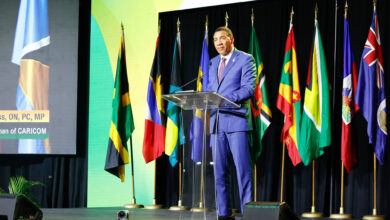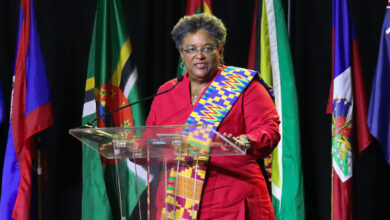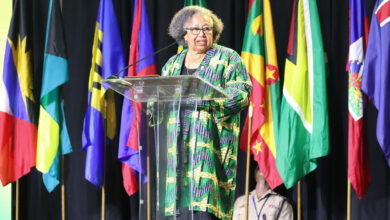1. The Fourth UK/Caribbean Forum, hosted by the Government of the United Kingdom took place at the Foreign and Commonwealth Office and Lancaster House in London on 10-12 May 2004. The Forum was co-chaired on the UK side by the Rt. Hon Jack Straw M.P, Secretary of State for Foreign and Commonwealth Affairs and by Mr. Bill Rammell, M.P, the Foreign and Commonwealth Office Minister responsible for UK-Caribbean relations, and on the Caribbean side by Dame Billie Miller, Minister of Foreign Affairs and Foreign Trade of Barbados and current Chair of the CARICOM Council for Foreign and Community Relations (COFCOR).
2. Foreign Ministers from Antigua and Barbuda, The Bahamas, Belize, Dominica, Grenada, Guyana, Jamaica, St Kitts and Nevis, Saint. Lucia and Trinidad and Tobago also attended, as did National Security Ministers from Jamaica, Saint Lucia and St Vincent and the Grenadines and the Minister of Foreign Trade and International Cooperation of Guyana. Suriname was represented at Ambassadorial level. Participatory Observers included Cuba, the Dominican Republic, the British Virgin Islands, the Cayman Islands, the Caribbean Community (CARICOM) Secretariat and the Caribbean Regional Negotiating Machinery (CRNM). Canada, the United States and several regional, private sector and non-governmental organizations also attended as guests.
3. The role of the Forum in enhancing and developing the unique ties that exist between the UK and the Caribbean was underscored by Ministers. As agreed by Heads of Government of Commonwealth Caribbean countries and the UK at their meeting in London on 2 December 2003 the agenda for the Forum focussed on the issues of regional security, international trade policy, the development agenda and HIV/AIDS.
4. Ministers recognised that the development efforts of Caribbean Governments can be undermined in several ways: including by security threats in all their manifestations, the disturbing rate of loss of human resources as a result of the HIV/AIDS pandemic and the continuing exodus of skilled personnel. They further noted that development efforts will be affected by the way the world trading system evolves and that support measures will be needed to facilitate the adjustments that developing countries will have to make. The Ministers noted that the varied threats to development in the Region are inextricably linked and believe a holistic approach with shared responsibilities between developed and developing countries is necessary.
SECURITY
5. UK and Caribbean Ministers agreed that the demand for illegal drugs in primary consumer countries, the consequential illegal trade in drugs and firearms, and the violence that accompanies it, money-laundering, as well as the multidimensional, non-traditional challenges to security, threaten to destabilise the political, economic and social fabric of the Region. These constitute some of the greatest challenges to Governments. Ministers resolved to work closely together to address these and other threats, including terrorism, and to develop and support the regional institutions necessary to combat them. They also recognised the benefits of enhancing the legislative framework in the fight against crime and agreed to pursue this, as a matter of priority, through their national parliaments where this has not already been done.
6. Ministers also acknowledged the importance of effective cooperation between the UK and Caribbean Governments on law enforcement and Security Sector Reform. They welcomed the progress made since the meeting between the CARICOM Ministerial Sub-Committee on Mobilisation of Resources for Regional Security and Mr. Bill Rammell, M.P, in Kingston, Jamaica on 3 March 2004, which considered a framework for UK/Caribbean Cooperation on Security Issues. Priority areas for cooperation under this framework include training, support for regional intelligence-sharing, border security and maritime co-operation. Ministers agreed to expedite consideration and finalization of the draft framework for security cooperation to allow for its adoption at the next meeting of the Conference of CARICOM Heads of Government in July 2004.
7. Caribbean Ministers welcomed the UK decision to help develop a regional staff command and leadership course to begin later this year. This was seen as an important step in enhancing the skills required of senior personnel in law enforcement and other security organisations to address, nationally and regionally, the threats of crime and violence. Caribbean Ministers also welcomed the initiative of the UK Government to organise a meeting between officials from the UK, CARICOM, Canada, the United States, France and the Netherlands to discuss ways to improve maritime cooperation. UK Ministers also announced their intention to second a customs officer to consult with the Coordinating Information Management Authority (CIMA) shortly to be established by CARICOM.
8. On border security, both sides agreed the importance of effective control of land as well as maritime borders. In this context Ministers agreed the attached statement on Belize/Guatemala. They also expressed satisfaction at the renewed commitment of Guyana and Venezuela to continue to avail themselves of the U.N. Good Offices Process for a peaceful settlement of their border controversy and to promote functional and economic cooperation under the aegis of the Guyana/Venezuela High Level Bilateral Commission. They expressed their strong support for the work of the Commonwealth Ministerial Group on Guyana/Venezuela aimed at maintaining the country's sovereignty and its right to develop all its territory.
DEVELOPMENT, TRADE AND INVESTMENT ISSUES
9. Ministers agreed that the development priorities for the Caribbean are the reduction of vulnerability to external shocks and non-traditional threats to security and integration of economic and social objectives within strategies for growth. It was recognised that, although progress has been made towards meeting the Millennium Development Goals, (MDGs) in most countries in the Caribbean, given the Region's prevailing vulnerabilities, unexpected economic crises would jeopardise the sub-Region's ability to sustain existing achievements and ultimately attain the agreed targets. It was noted that even as income grows, poverty is likely to persist if inequality and social exclusion are not systematically addressed. It was also noted that attainment of the Millennium Development Goals (MDGs) would require increased official development assistance. In this context, the UK's leading role in developing the International Financing Facility (IFF) was welcomed.
10. Ministers recognised the challenge faced by CARICOM countries in managing simultaneous trade negotiations in three theatres (World Trade Organisations (WTO), Free Trade Area of the Americas (FTAA) and Economic Partnership Agreements (EPAs) with the EU), in addition to the implementation of its own Single Market and Single Economy. UK Ministers confirmed that the UK would continue to provide support to the Regional Negotiating Machinery and to help Caribbean countries to achieve the benefits of international trade.
11. Ministers agreed on the desirability of restarting and making substantive progress in the Doha Development Round and on the importance of Special and Differential Treatment for small and vulnerable economies. They agreed to work together for liberalisation of the services sector, which offered opportunities for both the Caribbean and the UK. Ministers welcomed the recent launch of negotiations between the Caribbean and the European Union (EU) for a Regional Economic Partnership Agreement (EPA) and agreed on the importance of this agreement contributing to Caribbean development.
12. Ministers recognised the importance of the sugar industry and its multi-functional role to the economies of several Caribbean countries. Caribbean Ministers emphasized the importance of continued access to EU markets to sustain the industry and avoid further economic hardship. UK Ministers explained that reform of the EC Sugar Regime was inevitable and welcomed the efforts taking place in the Caribbean either to restructure the industry or to diversify. Ministers from both sides agreed it was important that Caribbean concerns should be taken into account as reform proposals were developed and that appropriate assistance to Caribbean countries should be considered in order to help them to adjust to the changes in the trading regime for sugar.
13. Caribbean Ministers expressed their concern that the consequence of successive changes brought about in the EU banana regime as a result of the World Trade Organisation (WTO) rulings continue to negatively impact on the export volumes and prices of Caribbean bananas to the EU. Ministers from both sides agreed that every effort should be made to ensure the EU honour its obligations under the Cotonou Agreement (Protocol V) to take measures aimed at ensuring the continued viability of the banana export industries and the continuing outlet for their bananas on the common market. At the same time Ministers recognised the importance of steps to facilitate the increasing market for pre-packaged organic, fair trade and other speciality bananas and to provide assistance to Caribbean countries to improve their capacity to exploit traditional and non-traditional markets. The UK promised to continue to support efforts by the European Commission to improve the delivery of adjustment assistance to the Caribbean banana industry.
14. Caribbean Ministers drew attention to the efficacy of the Caribbean rice industry with regard to employment creation in both the agricultural and manufacturing sectors of the economies in the Caribbean and the need for continued assistance to enhance the international competitiveness of Caribbean rice, in the light of increasing competition from extra-regional sources. They expressed concern over the impact on the regional industry of the reform of the European Union's Common Agricultural Policy (CAP). Both sides acknowledged the potential consequences the rice industry and the wider Caribbean societies would experience if trade liberalization resulting from the reform were to erode returns from the United Kingdom market, in particular, and the European Union as a whole. Caribbean Ministers called upon the UK to consider carefully the resolution on rice adopted at the recently concluded 79th Session of the ACP Council of Ministers, which took place in Botswana on 3-5, May 2004.
Tourism and Financial Services
15. Both sides acknowledged the importance of tourism- including eco-tourism -to the Caribbean, while recognizing the vulnerability of the industry. Caribbean Ministers expressed appreciation to the UK Government for hosting a Policy Workshop on Caribbean Tourism in November 2003 with the aim of raising the profile of tourism on the foreign and international trade policy agenda. Caribbean Ministers recognized the need to develop a regional approach to the promotion and development of tourism. The UK underlined its commitment to find ways to support the development of Caribbean tourism and set out current and proposed initiatives in this area.
16. Ministers welcomed the participation of private sector organisations in the Forum and expressed their appreciation to the Caribbean Britain Business Council and Croydon Chamber of Commerce for providing a private sector perspective of the challenges and opportunities for trade and investment between the UK and the region. They welcomed the decision of the UK private sector and the governments and the private sector organizations of the Caribbean to explore the establishment of a UK/Caribbean Business Forum. Ministers also welcomed the contribution of the Caribbean Association of Industry and Commerce. Ministers underlined their commitment to help Small and Medium Enterprises (SMEs) from the UK and the Caribbean do business in the others' region.
17. UK and Caribbean Ministers noted that the meeting of the Organisation for Economic Cooperation and Development (OECD) Global Forum focused on the issue of a level playing field for financial services and stressed that the way forward required that this issue be addressed as a priority. They emphasised the importance of tax and fiscal sovereignty, transparency and inclusiveness in the dialogue between the OECD and international financial centres in non-OECD jurisdictions. They recalled the declaration on this issue by the Commonwealth Heads of Government in Abuja in December 2003, and renewed the request to the Commonwealth Secretariat to support the affected jurisdictions to mobilise assistance to meet international standards, strengthen and deepen their financial sectors and diversify their economies.
HIV/AIDS
18. Ministers expressed concern at the high prevalence of HIV/AIDS in the Caribbean region and in that regard noted the successful initiatives undertaken by the Region to coordinate its response to and mobilize resources to combat HIV/AIDS under the Pan Caribbean Partnership (PANCAP) on HIV/AIDS within the context of the Regional Strategic Framework for HIV/AIDS. They welcomed the increasing support from donor agencies including grants totaling US$28.9 million for regional and national programmes over the next five years from the Global Fund for HIV/AIDS. They highlighted prevention and increased access to care and treatment for persons living with HIV/AIDS as well as strategies to address stigma and discrimination as some of the regional priorities for donor support. Caribbean Ministers welcomed the UK's contribution to the Clinton Foundation and the UK Government's support for the regional workshop on best practices in reducing stigma and discrimination against people living with HIV/AIDS, which will be convened in the Caribbean in the last quarter of 2004.
PARLIAMENTARY LINKS
19. Ministers welcomed the initiative of the Rt. Hon. George Foulkes MP and the Caribbean Britain Business Council in organising a UK/Caribbean Parliamentary Forum. They expressed satisfaction at the opportunity, which it provided for exchanges between Caribbean Ministers and UK Parliamentarians on matters of common concern, which reflected the enduring strength of the relationship between the UK and the Caribbean. Both sides expressed the hope that this dialogue would continue at the next meeting of the Forum.
THIRD EU-LAC SUMMIT
20. Both sides recognised the importance of the upcoming Third European Union/Latin America and the Caribbean (EU-LAC) Summit in Guadalajara Mexico on 28-29 May 2004, and expressed satisfaction that a meeting between the EU Troika and CARIFORUM countries would take place in the margins.
FORUM 2006
21. Ministers expressed appreciation to the Government of Barbados for offering to host the next UK/Caribbean Forum in 2006.
Lancaster House, London
12 May, 2004
Top




